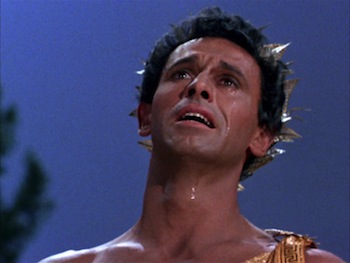“Who Mourns for Adonais?”
Written by Gilbert Ralston
Directed by Marc Daniels
Season 2, Episode 4
Production episode 60333
Original air date: September 22, 1967
Stardate: 3468.1
Captain’s log. Lieutenant Carolyn Palamas, the ship’s archaeology and anthropology officer, hands in a report to Kirk on the Pollux star system that they’re exploring. Scott then invites Palamas to coffee. The engineer is obviously smitten with her, though McCoy cautions that she’s not as smitten with him as he with her. They then have a conversation about how some day she’ll find the right man and leave the service, because naturally that’s the only possible option for a woman. And then I hit the pause button so I can go throw up and be grateful that it’s not 1967 anymore.
The ship goes into orbit around Pollux IV, which is Class-M, but with no signs of life. They start their usual mapping, but then an energy formation appears in front of the ship that’s in the shape of a giant hand. They can’t move away from it, and then it just grabs the ship, holding it in place. Nothing they try works, including rocking the ship back and forth or adjusting the tractor beams to repel.
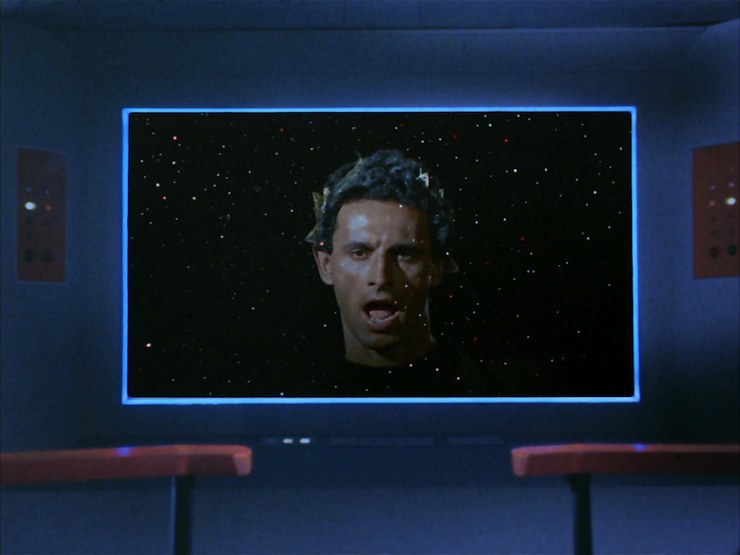
And then another energy formation appears, this time in the shape of a face, who calls the crew his children and welcomes them to his world, all impressed that they left their plains and valleys and went out into space. Kirk tries to get him to release the ship, but the being is unimpressed and kinda pissed that Kirk’s copping such an attitude. He closes his hand a bit to remind him who’s got the power here, which nearly destroys the ship, and then invites Kirk and his crew down—but not Spock, as he reminds him too much of Pan (the latest in a series of Greek mythical and historical references).
Kirk, Scotty, McCoy, Chekov, and Palamas beam down, the latter to help translate the being’s arcane references. The beam-down site looks like a Greek temple, with the being wearing a gold lamé toga. He identifies himself as Apollo, claiming to have visited Earth in the past. McCoy’s scans say he’s a simple humanoid, apart from a strange organ whose purpose McCoy can’t determine.
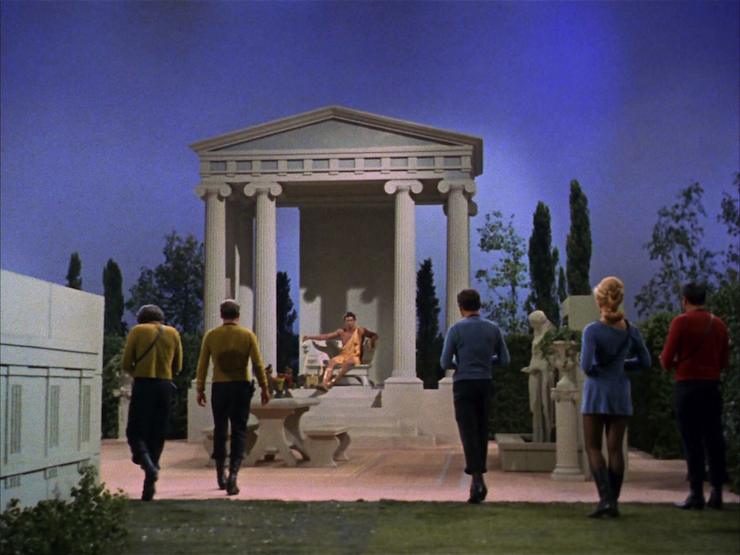
Apollo says that the Greek gods were all alien travelers who visited Earth 5000 years ago, and who were worshipped by the people they found. He also makes it clear that the Enterprise isn’t leaving, as they will stay and worship him as his ancestors did. Kirk refuses, so Apollo grows to 50 feet tall to again make it clear who’s got the power here. Then he fades away.
Communications between the Enterprise and the landing party have been cut off. Spock has Sulu continue to work on trying to break out of the “hand,” while Uhura keeps trying to raise the landing party and Kyle tries to get a sensor scan. But all their efforts are stymied by Apollo.
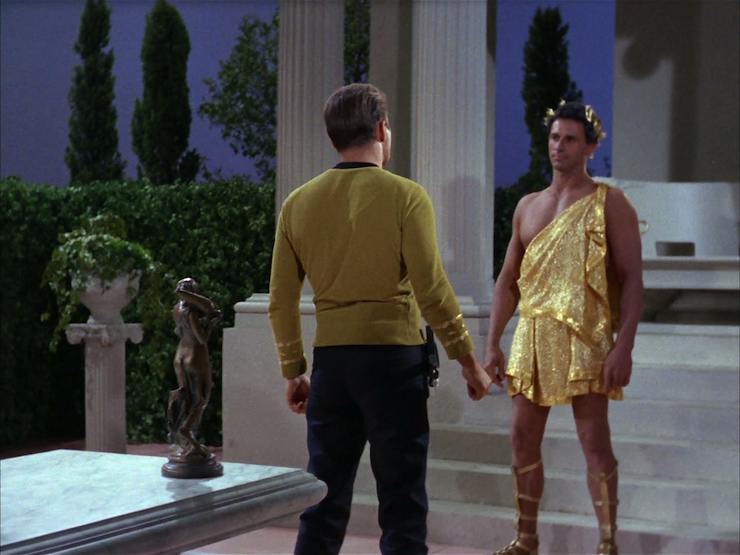
Palamas provides Kirk with the Wikipedia entry on Apollo, and Kirk orders Scotty and Chekov to find the source of his power. Then he reappears, saying he wants what’s rightfully his: loyalty, tribute, worship. In exchange, he will provide them with a life in paradise. But they’re not interested, and Apollo gets pissy.
When Palamas expresses confusion as to why Apollo’s being such a dick, Apollo immediately starts flirting with her. This annoys Scotty, who expresses his displeasure first verbally, then by pulling out his phaser. Apollo strikes the weapon from Scotty’s hand and fuses the innards of all their phasers. He then transforms Palamas’s uniform into a fuschia toga of her own and takes her away, over Scotty’s objection. Apollo’s response to said objection is to toss Scotty across the field.
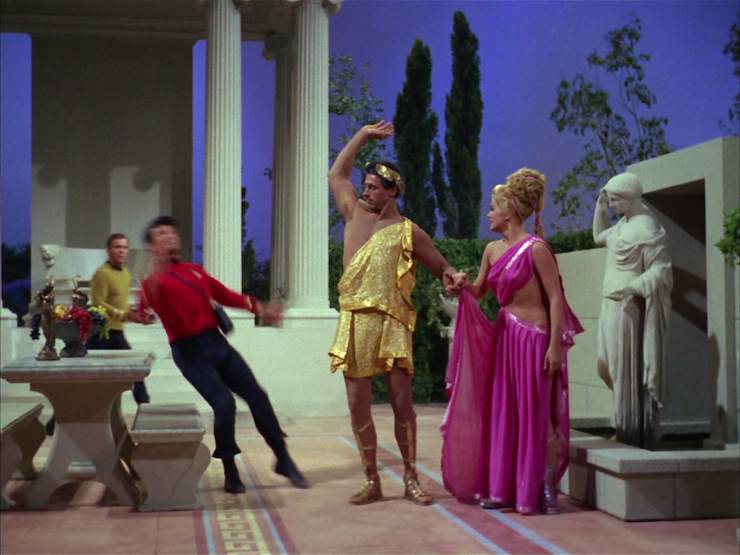
Palamas agrees to go, in part so she can learn more. Once Scotty recovers, and Kirk upbraids him for being an impulsive twit, he orders him and Chekov to continue their search for his power source.
Back on the ship, Sulu finds an energy source, but he’s having trouble pinpointing it. He works on doing so, as that may be the key to stopping Apollo. With help from Leslie, he engages in a sector-by-sector search of the planet. Spock gives Kyle some equations that would allow them to channel ship’s power to punch some holes in Apollo’s hand.
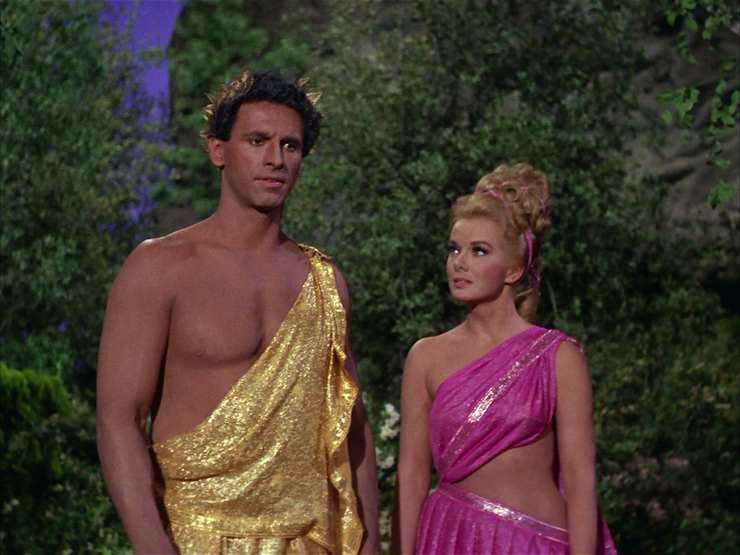
Apollo brings Palamas to a lake, declaring her to be more beautiful than Daphne or Cassandra. He tells her that the other gods “returned to the cosmos.” They left Earth because the people no longer worshipped them, and they need worship the way humans need food. Rather than destroy the humans for their effrontery, they returned home to Pollux IV, but it was an empty life. They all, basically, committed suicide, except for Apollo, because he knew humanity would venture to the stars eventually.
And then he smooches Palamas.
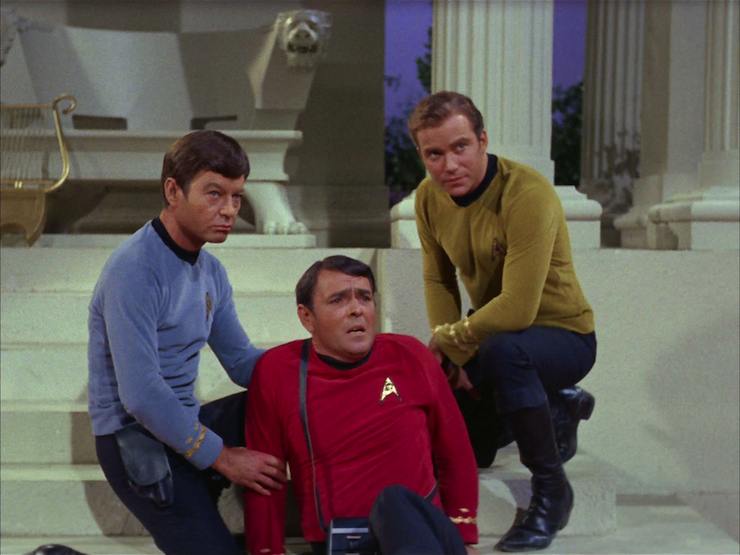
Scotty and Chekov find the same energy pulsations that Sulu found, but they’re also having trouble locating it. Then Apollo reappears without Palamas. Scotty gets peevish again, and again tries to rush Apollo, with worse results than last time, as Apollo blasts him hard enough to cause nerve damage. Kirk angrily informs Apollo that instead of worshippers, he now has enemies—so Apollo cuts off his airway.
Apollo sits on his throne, announces that they all require discipline—but then he looks fatigued and fades away. Kirk hypothesizes that he needs to recharge after an expenditure of energy—like throwing Scotty around and Force-choking Kirk—so what they need to do is provoke him to use his powers as much as possible. So when Apollo reappears, with Palamas this time, the rest of the landing party studiously ignores him at first. Kirk then yells at him, saying he doesn’t know humanity, he knows what humanity was millennia ago, but they’re not the same people who were impressed with their parlor tricks.
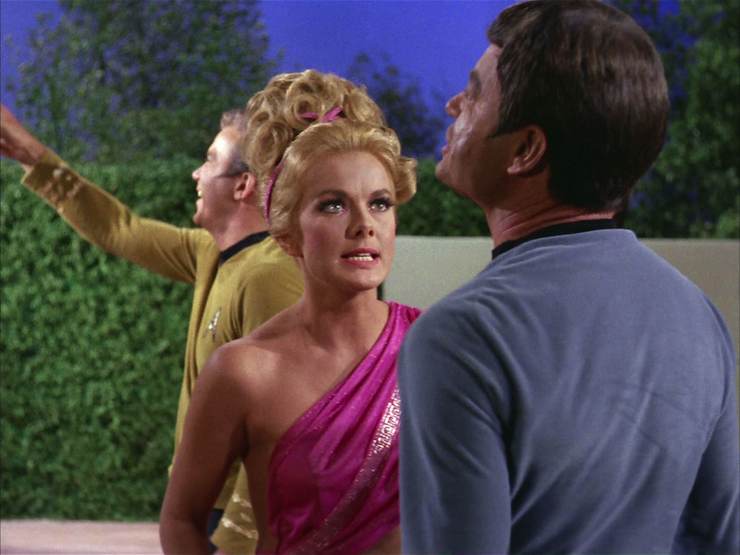
And then they turn their backs on him. Apollo gets more and more pissed off, so then they face him and laugh heartily at how ridiculous he is (easy to do when he’s wearing that toga). Furious, Apollo is about to strike Kirk down, but Palamas moves to block his blast, saying that Apollo would never harm his children. For her sake, he relents, and they disappear.
Kirk is cranky that Palamas spoiled his plan, and Apollo’s even more cranky that they reject his gifts. He insists that they strip down the ship for parts and use it to build the structures they need to live. He also insists that humanity has lost track of what’s important in the last 5000 years.
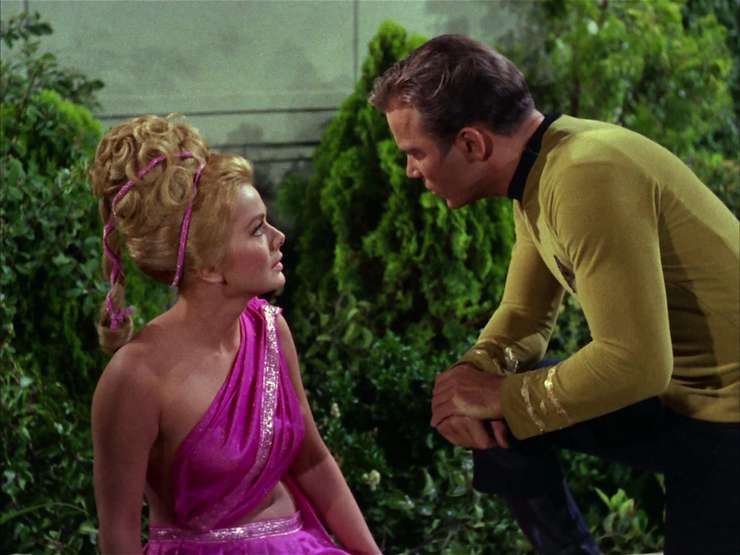
Palamas is returned to the landing party with Apollo’s message. Kirk orders her to come down from Mount Olympus and to spurn him. Palamas reveals that she loves him, and that he’s so lonely. Rejecting him would break her heart, she says, but Kirk reminds her that accepting him will condemn the entire crew to slavery.
She goes off, and then Uhura manages to get communications through. Spock reports that Sulu has pinpointed the energy source: it’s Apollo’s throne. Kyle has been able to poke holes in the force field that they can fire through. Kirk tells Spock to have Sulu fire phasers, but to wait for Kirk’s order.
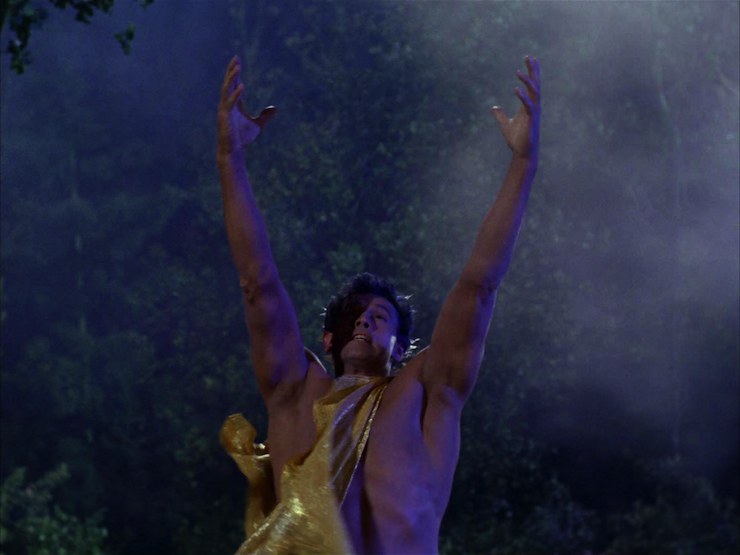
Palamas proceeds to ask Apollo a bunch of scientific questions, as she’s curious about his evolutionary development—her specialty is ancient relics, after all. She tries to walk away from him, and he summons a huge storm, growing in size again, and looming menacingly over Palamas, who has been thrown to the ground.
With the storm worsening, Kirk orders Spock to fire phasers while the landing party takes cover behind some rocks. (McCoy, Scotty, and Chekov run around and behind the rocks; Kirk leaps over the rock in a manly manly fashion to get behind it.)
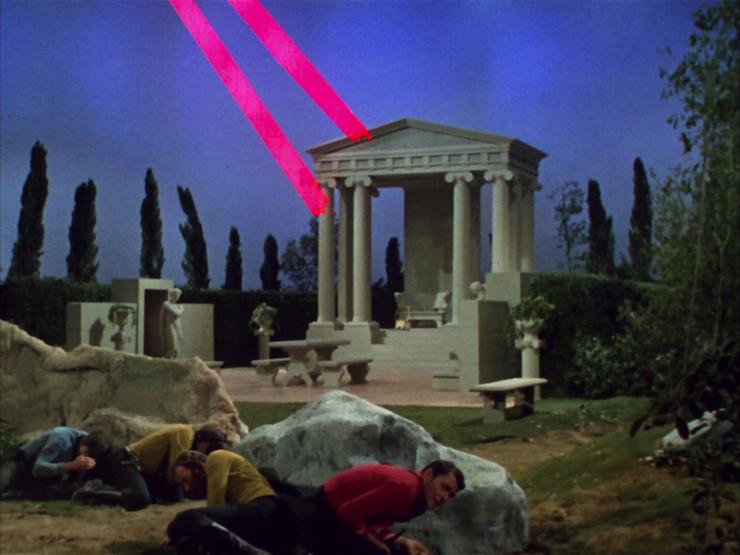
Sulu fires phasers. Apollo reappears with Palamas and fights against the phasers. Scotty breaks cover to get Palamas to safety.
Despite Apollo’s efforts, the temple is destroyed. Tears in his eyes, Apollo tells Kirk he would have cherished them, loved them as a father loves his children. Kirk continues the analogy, saying they’ve outgrown him. He declares his love for Palamas, and then does what he describes the other gods as having done: spreading himself thin and discorporating.
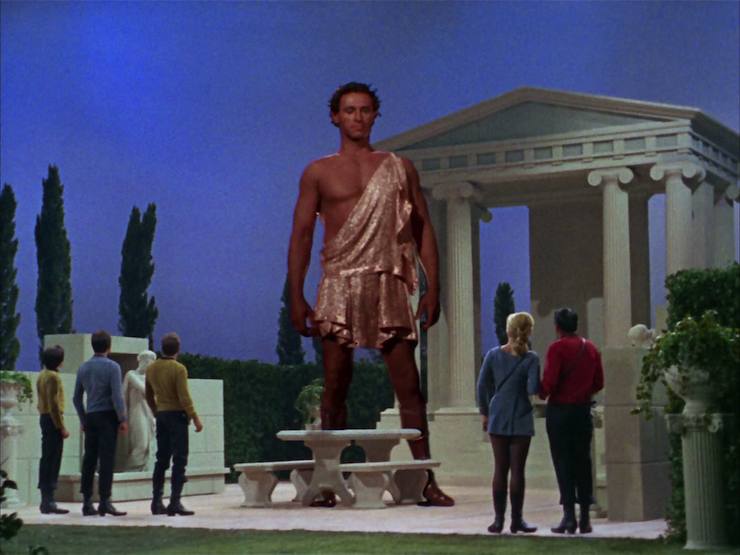
Kirk and McCoy admits to sadness at what they were forced to do—after all, the Greeks who worshipped Apollo were responsible for a great and influential civilization. Would it have hurt, Kirk wonders, to gather a few laurel leaves?
Can’t we just reverse the polarity? Spock has Kyle use “M-rays,” whatever those are, to penetrate Apollo’s hand-shaped force field. The equations for the M-rays are given to the nuclear electronics lab for implementation, a lab never referred to before or since.
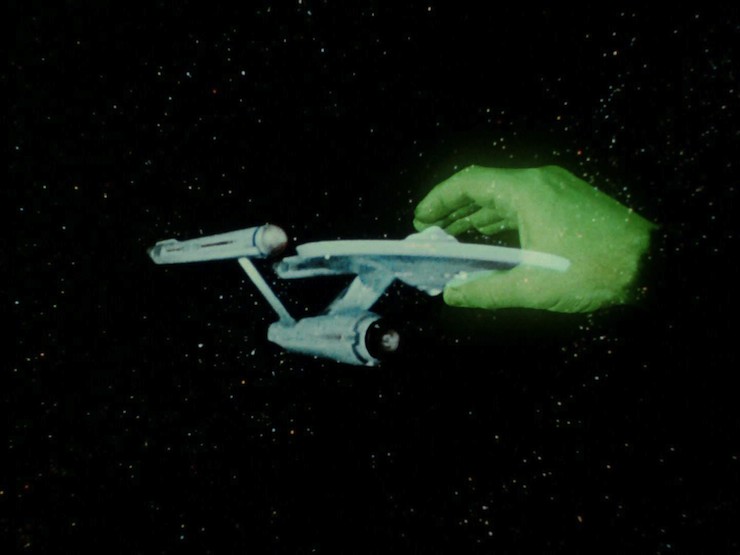
Fascinating. Spock asks Kyle where Apollo is located, even though Apollo didn’t identify himself to the crew by name until after the landing party beamed down, and Spock hasn’t been in touch with them since then.
I’m a doctor not an escalator. Since Spock isn’t on the landing party, it’s left to McCoy to say, “Fascinating” when Apollo grows to 50 feet and then disappears.
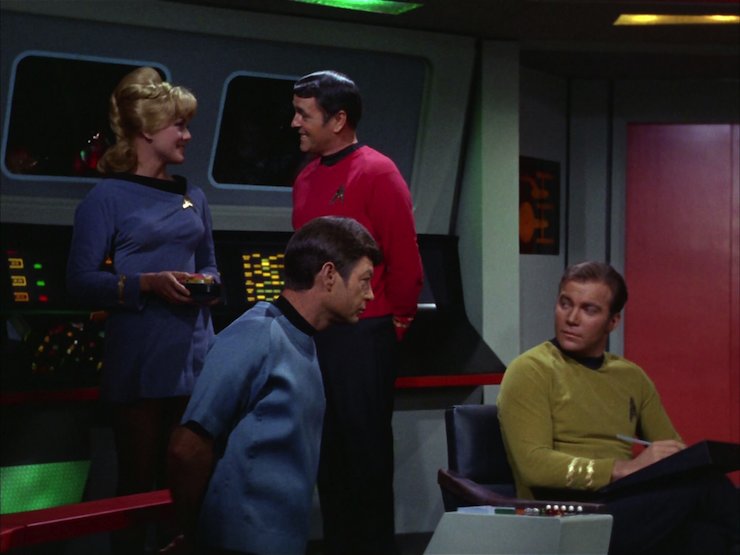
I cannot change the laws of physics! Scotty is totally goofy-eyed over Palamas, and that warps his behavior throughout, mostly making him do stupid stuff in her defense.
Ahead warp one, aye. Sulu can’t pinpoint the energy source, so Spock tells him to search for where it isn’t, and that will lead him to where it is. When Sulu asks, “The whole planet, sir?” Spock just looks at him, and Sulu smiles and says, “Yes, sir, the whole planet.”
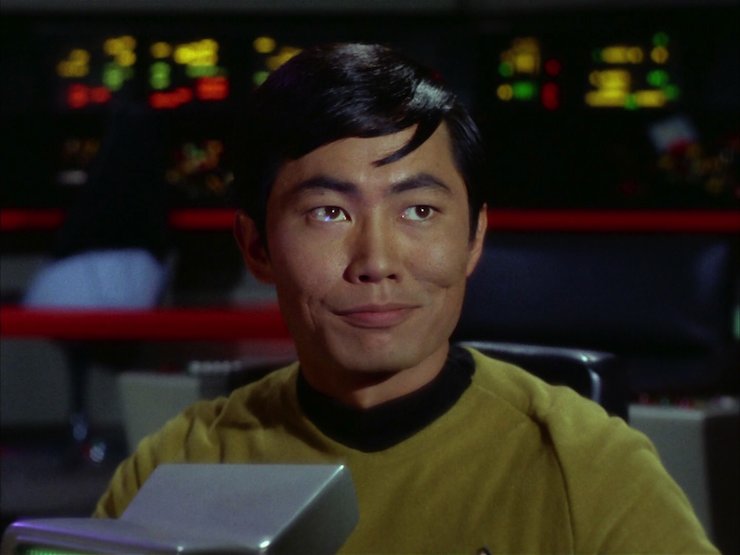
Hailing frequencies open. Uhura rigs a subspace bypass circuit to cut through Apollo’s interference. Because she’s just that awesome.
It’s a Russian invention. Chekov insists that the cat who disappears leaving only a smile behind is from a Russian story, not a British one. (Alice in Wonderland.)
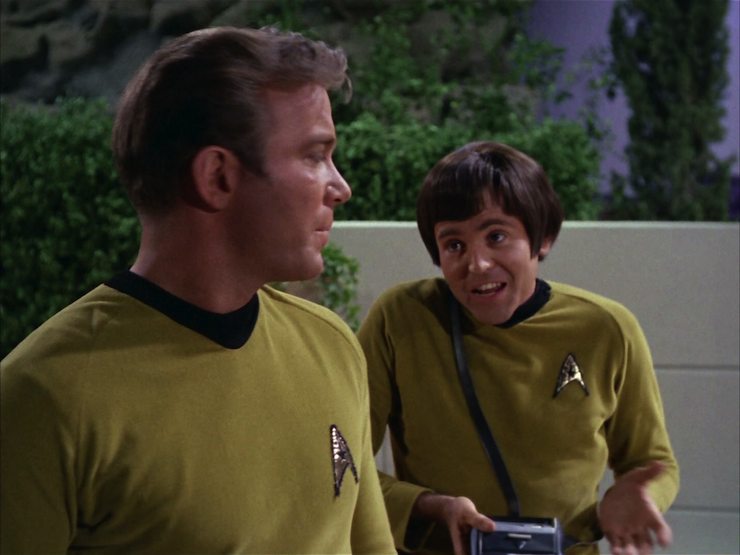
No sex, please, we’re Starfleet. Palamas gets the best line of the episode, when she rejects Apollo, asking, “Is that the secret of your power over women? The thunderbolts you throw?” Wah-HEY!
Channel open. “We have no need for gods. We find the one quite adequate.”
Kirk mistaking monotheism for advancement.
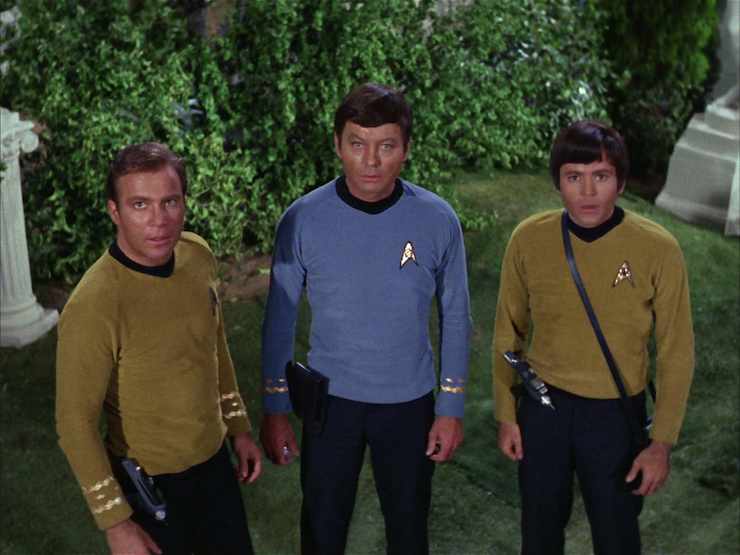
Welcome aboard. Michael Forest plays Apollo with impressive dignity while Leslie Parrish looks hot in a fuschia toga as Palamas. Plus we have recurring regulars James Doohan, George Takei, Nichelle Nichols, Walter Koenig, and John Winston, the latter identified by name as Kyle for the first time.
Trivial matters: The title derives from the Percy Bysshe Shelley poem Adonais: An Elegy on the Death of John Keats, which was used by Shelley to describe Keats, both as a variant on the Greek god Adonis and the plural of the Hebrew for God, Adonai.
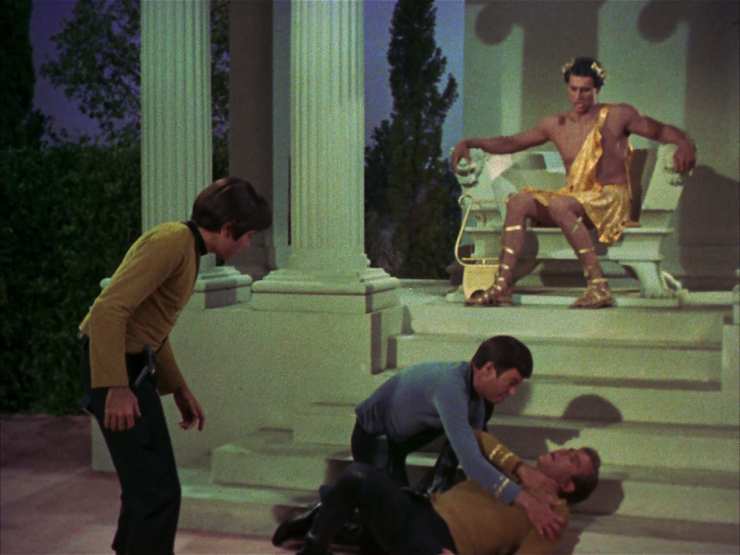
The original ending for the episode established that Palamas was pregnant by Apollo. James Blish’s adaptation in Star Trek 7 kept that intact, and Peter David established in the Star Trek: New Frontier novel series that Palamas had the child. The NF character Marc McHenry is a descendant of Palamas and Apollo, and Artemis guided him through childhood as an “imaginary friend,” as established in the NF novel Being Human.
The Greek gods were seen again in the 53rd issue of Gold Key’s Star Trek comic by George Kashdan & Alden McWilliams.
Gene L. Coon did an uncredited rewrite of the episode.
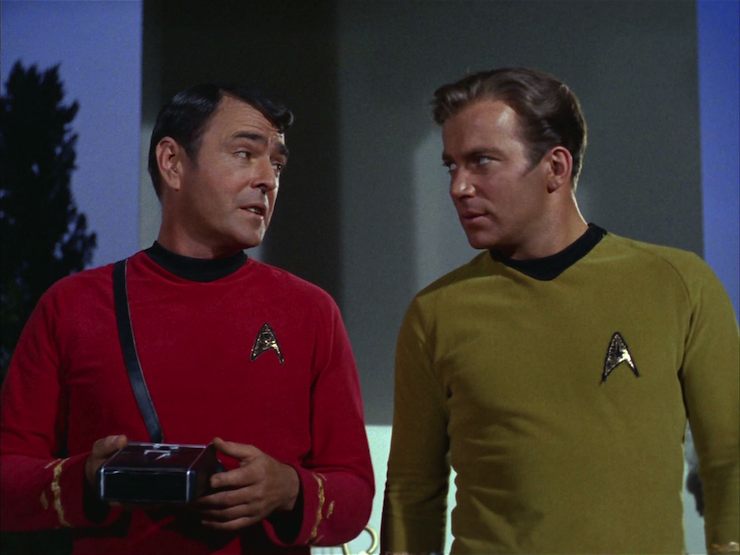
The producers considered Jon Voight for the part, but he was unavailable, and they also looked into hiring British actors, and eventually went to the San Diego Shakespeare Festival, where they got a recommendation from the head of the festival to look at Forest, who got the part.
In Kevin Ryan’s Errand of Vengeance and Errand of Fury trilogies, he named an Enterprise security officer Leslie Parrish in honor of the actor who played Palamas.
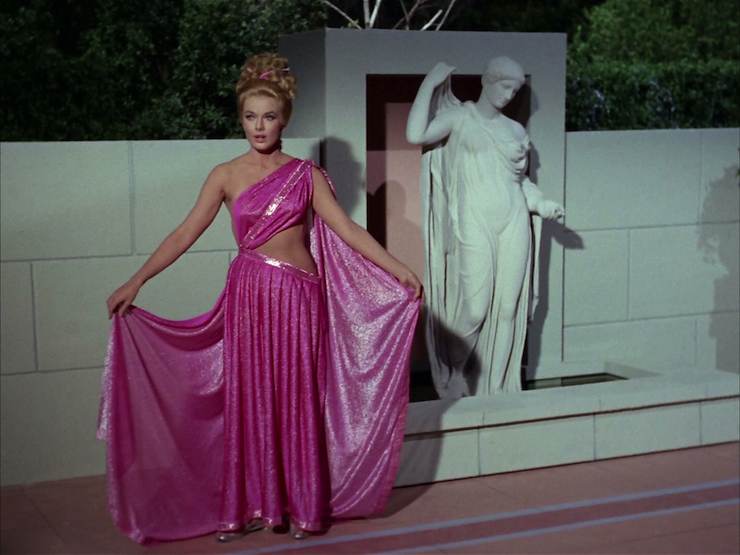
To boldly go. “A god cannot survive as a memory.” So much of rewatching the original Star Trek requires filtering for the time period. Most of the time, it’s easy to do. Sometimes it’s a lot harder to get past it.
This is one of the latter. The general storyline is excellent. The notion of alien beings who were worshipped by ancient humans as gods is hardly new—the Marvel Comics character of Thor was built on it prior to this, the entire Stargate franchise will be built on it, and your humble rewatcher has used it as the spine of a cycle of short stories, to name but three of hundreds of examples—but it recurs because it’s a good one. It helps that Michael Forest puts in a bravura performance here, lending regal dignity to a role that absolutely requires it (especially while wearing that hilarious toga).
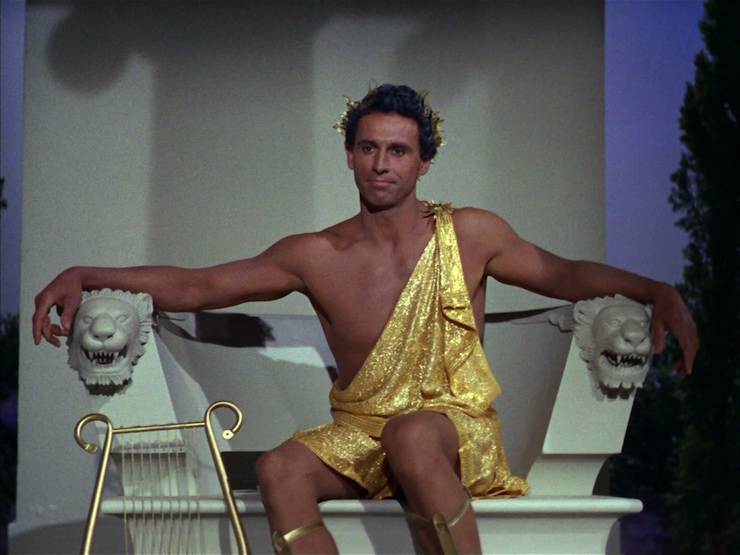
But the episode is mostly contaminated by the horrific sexism. It’s the same nonsense we got with McGivers in “Space Seed”: a female scientist who meets a living, breathing example of the thing she’s an expert in and instantly goes weak in the knees for him. It’s appalling, made more so by the simply dreadful performance by Leslie Parrish, who was obviously cast more for her ability to look good in a fuschia toga than her ability to actually act. And unlike McGivers, we don’t even really get any kind of sense of who she is, or why she falls for Apollo.
The sexism isn’t the only problem. Mind you, it’s only one line of dialogue, but sheesh. In an entire episode about how humanity has outgrown the notion of worshipping higher beings, Kirk says, “We find the one [god] sufficient.” The assumption of universal monotheism is ridiculous, and no more or less ridiculous than worshipping a pantheon. Kirk’s analogy to slavery would still work without diminishing polytheism in favor of monotheism.
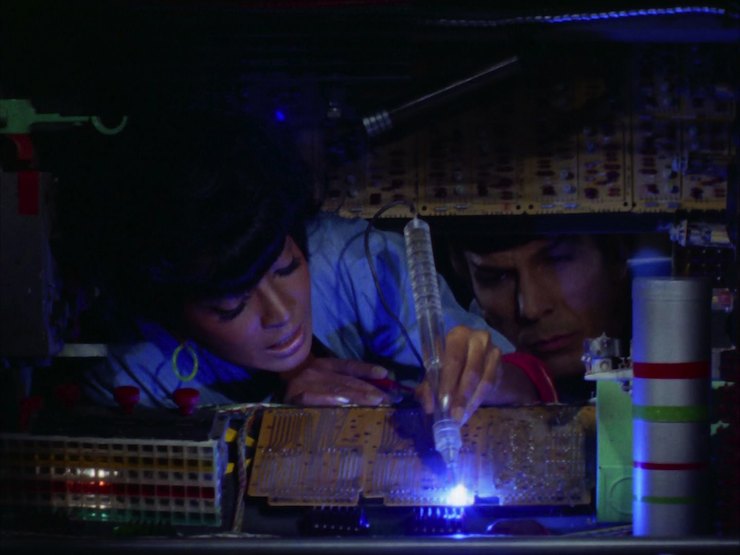
Having said all that, the episode is still enjoyable once you filter out the ick. It’s a good use of a fairly standard premise, with the whole crew working together to solve the problem. I particularly like that Uhura, Sulu, McCoy, and Chekov are all part of the solution to defeating Apollo (Scotty is less helpful, but that’s because he’s too busy drooling over Palamas).
Warp factor rating: 6
Next week: “Amok Time”
Keith R.A. DeCandido‘s Heroes Reborn eBook novella Save the Cheerleader, Destroy the World is now available for preorder, as are five more novellas by Timothy Zahn, Stephen Blackmoore, Duane Swierczynski, and Kevin J. Anderson & Peter J. Wacks, all of which tie into the new NBC series. They can be preordered from Amazon, Barnes & Noble, or Kobo.










